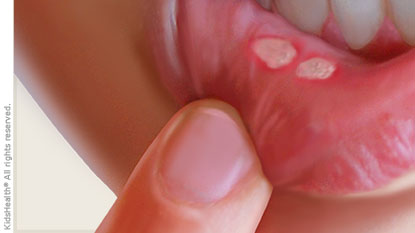- Parents Home
- Para Padres
- A to Z Dictionary
- Allergy Center
- Asthma
- Cancer
- Diabetes
- Diseases & Conditions
- Doctors & Hospitals
- Emotions & Behavior
- First Aid & Safety
- Flu (Influenza)
- Food Allergies
- General Health
- Growth & Development
- Heart Health & Conditions
- Homework Help Center
- Infections
- Newborn Care
- Nutrition & Fitness
- Play & Learn
- Pregnancy Center
- Preventing Premature Birth
- Q&A
- School & Family Life
- Sports Medicine
- Teens Home
- Para Adolescentes
- Asthma
- Be Your Best Self
- Body & Skin Care
- Cancer
- Diabetes
- Diseases & Conditions
- Drugs & Alcohol
- Flu (Influenza)
- Homework Help
- Infections
- Managing Your Weight
- Medical Care 101
- Mental Health
- Nutrition & Fitness
- Q&A
- Safety & First Aid
- School, Jobs, & Friends
- Sexual Health
- Sports Medicine
- Stress & Coping
Canker Sores
What Are Canker Sores?
If you've ever had a canker (say: KAN-kur) sore, you know that these small mouth sores can cause major pain.
A canker sore can show up on the inside of your lip or cheek, under your tongue or at the base of your gums. Usually, canker sores form one at a time, but sometimes they show up in a little cluster.
Canker sores usually go away on their own and they're not contagious. So no one can catch a canker sore by kissing you or sharing your drink.
What Are the Signs of a Canker Sore?
Canker sores are round and usually about the size of a kernel of corn (¼ inch, or 6 millimeters), but they can be bigger. If you look in the mirror at your canker sore, it will be white or yellow with a red border.

Canker sores hurt, especially if you eat something hard, crunchy, salty, or acidic (like orange juice).
What Causes Canker Sores?
No one really knows what causes canker sores. But stress might make a person more likely to get one. A canker sore also may spring up if a person's diet doesn't contain enough vitamins and minerals.
The inside of your mouth is delicate, so mouth injuries, such as biting the inside of your lip or brushing your teeth too hard, also seem to bring on canker sores.
Anybody can get a canker sore and they may run in families, which means that if your mom or dad gets canker sores, you might get them too.
Cold sores (fever blisters) are a different kind of mouth sore and are caused by a virus. Cold sores and fever blisters often form outside the mouth, around the lips, on the cheeks or chin, or inside the nostrils of the nose. Unlike canker sores, those sores are contagious.
How Are Canker Sores Treated?
Most canker sores don't hurt as much after the first few days, but it may take 2 weeks for the sore to heal. While you're waiting, be careful when eating and brushing your teeth. Drinking through a straw can help. Scraping the sore can make it hurt worse. You might need some medicine to dull the pain. Your mom or dad can ask your doctor about which one is best for you.
If your canker sore is big, lasts longer than a week, or is keeping you from eating, see your doctor or dentist. He or she may prescribe a medicine or special mouthwash to help heal the sores.
Can I Prevent Canker Sores?
There's no sure way to prevent canker sores, but it's a good idea to eat healthy, get enough sleep, and try not to get too worried or upset. Put canker sores on the list of things you don't have to worry about. They hurt for a little while, but before you know it, they'll be gone.

© 1995- The Nemours Foundation. KidsHealth® is a registered trademark of The Nemours Foundation. All rights reserved.
Images sourced by The Nemours Foundation and Getty Images.